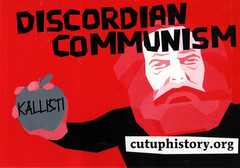>>It is of course true that millions of other people lost their lives in this conflict, often in unprecedentedly horrible ways, and that new tyrannies were imposed on the countries—Poland, Czechoslovakia and China most notably—that had been the pretexts for a war against fascism. But is this not to think in the short term? Unless or until Nazism had been vanquished, millions of people were most certainly going to be either massacred or enslaved in any case.<< Christopher Hitchens: A War Worth Fighting
Category: Communism
Anti-Communism for Beginners
>>11. Constantly attack ‘Communist’ regimes for actions that occur in capitalist regimes up to this very day.<< Eastern Star: Guide to Anti-Communism
The End was supposed to be the Beginning
>>The Final Solution, as the Nazis called it, was originally only one of the exterminatory projects to be implemented after a victorious war against the Soviet Union. Had things gone the way that Hitler, Himmler, and Göring expected, German forces would have implemented a Hunger Plan in the Soviet Union in the winter of 1941–1942. As Ukrainian and south Russian agricultural products were diverted to Germany, some 30 million people in Belarus, northern Russia, and Soviet cities were to be starved to death. The Hunger Plan was only a prelude to Generalplan Ost, the colonization plan for the western Soviet Union, which foresaw the elimination of some 50 million people. (…)
At a time when German resistance to Hitler receives attention in the mass media, it is worth recalling that some participants in the July 1944 plot to kill Hitler were right at the center of mass killing policies: Arthur Nebe, for example, who commanded Einsatzgruppe B in the killing fields of Belarus during the first wave of the Holocaust in 1941; or Eduard Wagner, the quartermaster general of the Wehrmacht, who wrote a cheery letter to his wife about the need to deny food to the starving millions of Leningrad.<< The New York Review of Books: Holocaust: The Ignored Reality. Also contains often neglected facts about the Great Terror in the Soviet Union, the geographics of World War II’s mass killings, and about the Expulsion of Germans (“Vertreibung”) after the war:
>>Although the expulsions were a case of collective responsibility, and involved hideous treatment, mortality rates among German civilians—some 600,000 out of 12 million—were relatively low when compared to the other events discussed here. Caught up in the end of a horrible war fought in their name, and then by an Allied consensus in favor of border changes and deportation, these Germans were not victims of a calculated Stalinist killing policy comparable to the Terror or the famine.<< (Hat Tip: Will)
T-Shirts
Designed by Oona, cost 10 quid plus shipping, available in S, M and L, order via Sozialistischer Plattenbau.
More work in more time
Meanwhile, by 2000 the average married couple with children was working almost five hundred hours a year more than in 1979. [ … ] By 1991 the amount of goods and services produced for each hour of labor was double what it had been in 1948. By 2006 that figure had risen another 30 percent. [ … ] if as a society we made a collective decision to get by on the amount we produced and consumed seventeen years ago, we could cut back from the standard forty-hour week to 5.3 hours per day—or 2.7 hours if we were willing to return to the 1948 level.
Space Communism
Going to Space or Making Communism first?
Oona Leganovic as Ijon Tichy
Daniel Kulla as Captain Kathryn Janeway
Live at the 24th Chaos Communication Congress, Berlin
Dec 29, 2007
Good girls gotta get down with gangsters
Moral politics regards the pop culture hype around prostitution and drug trade as a sign of decay and watch it in horror because they cannot relate the phenomenon to their picture of good old free market economy. Moral communists only see and hear the final phase of late capitalism, the cultural breakdown signalling the total collapse of bourgeois society.
Discordian Communists see capitalism in full effect and have no idea why it still shouldn’t at least sound good.
700 Intellectuals Pray to an Oil Tanker
>>1.
Without an invitation
We have come
700 (and many more are on the way)
From all over, where the wind no longer blows
From the treadmills, which grind slowly, and
From the ovens, behind which, it is said
Not even a dog remains.
2.
And we have seen thee
All of a sudden, the night long
Oil tanker.
3.
Yesterday thou wert not there
But today
Thou art the only one.
4.
Come, hurry, ye!
Ye who saw the branch on which ye sit
Working folk!
God has descended again
In the form of an oil tanker.
5.
Thou, the repulsive one
Art gorgeous!
Exercise force over us
Thou, the objective one!
Snuff out our ego!
Make a community out of us!
Then, not as we want:
Rather, as thou wilt.
6.
Thou art not made of ivory
And of ebony, but of
Iron.
Wonderful! Wonderful! Wonderful!
Thou, the unprepossessing one.
7.
Thou art not an invisible one
Nor art thou infinite!
On the other hand, seven metres high
There are no secrets in thee
Rather, there is oil,
And thou dealest with us
Not discretely, nor unfathomably
But with calculation.
8.
What is grass for thee?
Thou sittest on it.
Where, formerly, there was grass
There thou sittest now, oil tanker!
And for thee an emotion is
Naught.
9.
Therefore listen to our prayer
And deliver us from evil.
In the name of electrification
And of progress and statistics!<<
Bertolt Brecht, ca. 1926.
And just for once spare me the instant reflex that makes so many people say “Iraq” within five seconds after reading just the title line.
Karl Marx rolling the Apple of Discord
I had NeinAffeNein and Selbstmordparty produce these stickers to proliferate:
Whoever wants some of them, simply contact me.
The end to the means
>>Everyone’s got a mortgage to pay.<< (Thank you for smoking)

